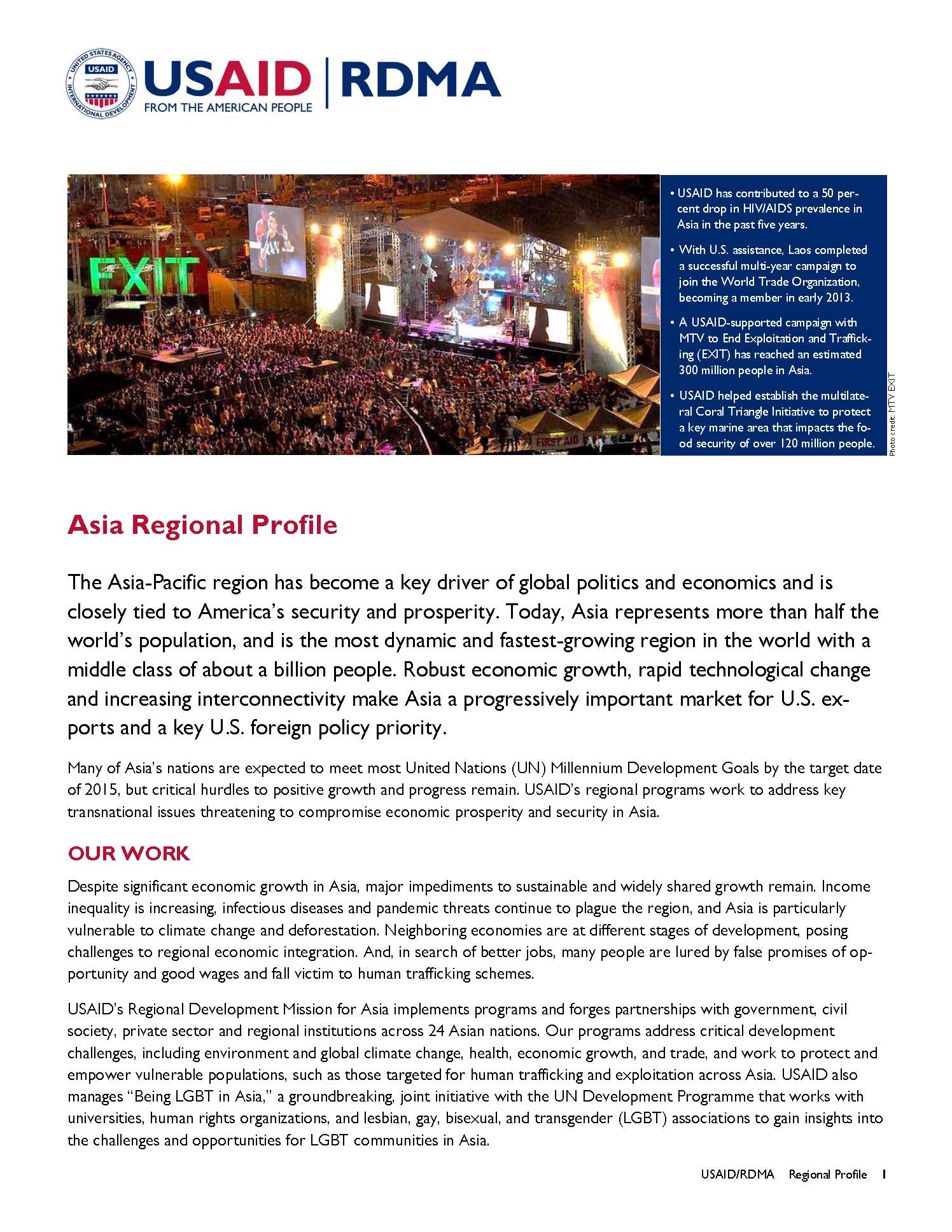![]() (292k) RDMA Profile
(292k) RDMA Profile
The Asia-Pacific region has become a key driver of global politics and economics and is closely tied to America’s security and prosperity. Today, Asia represents more than half the world’s population, and is the most dynamic and fastest-growing region in the world with a middle class of about a billion people. Robust economic growth, rapid technological change and increasing interconnectivity make Asia a progressively important market for U.S. exports and a key U.S. foreign policy priority.
Many of Asia’s nations are expected to meet most United Nations (UN) Millennium Development Goals by the target date of 2015, but critical hurdles to positive growth and progress remain. USAID’s regional programs work to address key transnational issues threatening to compromise economic prosperity and security in Asia.
OUR WORK
Despite significant economic growth in Asia, major impediments to sustainable and widely shared growth remain. Income inequality is increasing, infectious diseases and pandemic threats continue to plague the region, and Asia is particularly
vulnerable to climate change and deforestation. Neighboring economies are at different stages of development, posing
challenges to regional economic integration. And, in search of better jobs, many people are lured by false promises of opportunity and good wages and fall victim to human trafficking schemes.
USAID’s Regional Development Mission for Asia implements programs and forges partnerships with government, civil
society, private sector and regional institutions across 24 Asian nations. Our programs address critical development
challenges, including environment and global climate change, health, economic growth, and trade, and work to protect and empower vulnerable populations, such as those targeted for human trafficking and exploitation across Asia. USAID also manages “Being LGBT in Asia,” a groundbreaking, joint initiative with the UN Development Programme that works with universities, human rights organizations, and lesbian, gay, bisexual, and transgender (LGBT) associations to gain insights into the challenges and opportunities for LGBT communities in Asia.
ENVIRONMENT AND GLOBAL CLIMATE CHANGE
Asia is home to three of the world’s six largest greenhouse gas emitting countries. USAID supports regional partnerships to reduce greenhouse gas emissions, catalyze the adoption of clean energy technologies and reduce deforestation. USAID also promotes climate-resilient agriculture and infrastructure development, and helps establish more climate-resilient fisheries and coastal communities. USAID’s regional anti-wildlife trafficking efforts work to reduce consumer demand for illegal wildlife products and increase the capacities of law enforcement. USAID also provides support to protect and sustain one of the world’s most important marine biodiversity areas, the Coral Triangle, which impacts the food security of more than 120 million people in the region. And in order to support the long-term sustainable development of the Mekong River, which runs through six countries and supports the livelihoods of 60 million people, USAID uses science and technology to better inform policies that address large-scale hydropower and irrigation development.
GLOBAL HEALTH
USAID helps build and improve health systems that can stop the spread of infectious diseases. USAID implements state-of-the-art HIV prevention, care and treatment programs that target affected populations in Burma, Laos and Thailand. USAID also helps Asia-Pacific countries address the spread of tuberculosis (TB) and multidrug-resistant TB by introducing new diagnostic tools, providing training and equipment to strengthen lab systems, and advancing research. USAID implements programs to control the occurrence and spread of drug-resistant malaria through personal protection, drug quality control and disease surveillance. USAID and the Thai government recently launched their first ‘trilateral aid’ effort to reduce drug-resistant malaria along the Thai-Burma border.
ECONOMIC GROWTH AND TRADE
USAID supports regional platforms such as the Association of Southeast Asian Nations, the Lower Mekong Initiative and the Asia-Pacific Economic Cooperation forum in their efforts to enhance trade and competitiveness and bolster economic growth in Southeast Asia. USAID assists with supply chain integration, legal reform, good governance, information and communications, and technology development and applications. USAID also promotes greater dialogue among the private sector, government and civil society to enhance sustainable production and trade in the agriculture and aquaculture sectors. Other USAID efforts support the development of an agricultural learning platform so that farmers in Bangladesh, Nepal and Cambodia can benefit from new agricultural practices and technologies. USAID provides technical and other assistance to food security priority countries in the region.








Comment
Make a general inquiry or suggest an improvement.